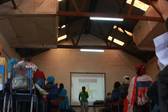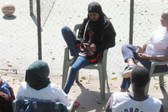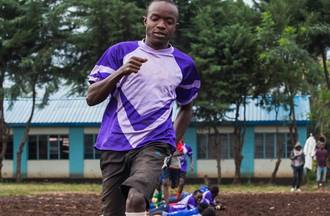Strengthening Resilience to Violent Extremism (STRIVE) II Kenya
Following on from STRIVE Horn of Africa, this project was the second delivered by RUSI as part of the EU’s global STRIVE platform.
STRIVE II sought to build on achievements and lessons learned during STRIVE Horn of Africa. The programme, implemented by the RUSI Nairobi office, was designed in response to the rapidly evolving Violent Extremist (VE) threat in Kenya.
The aim of the programme was to contribute towards reducing radicalisation, recruitment and support for violent extremism by addressing structural factors, group-based dynamics, enabling factors and individual incentives in Kenya. While STRIVE II monitored and responded to the growth of Islamic State and other VE actors, the programme focused primarily on Al-Shabaab.
The project had four main components: research, law enforcement training, youth mentorship, and preventive communications. In addition to delivering a range of interventions to reduce radicalisation, recruitment and support for VE, STRIVE II contributed extensively to the evidence base for CVE programming.
STRIVE II focused not only on improving and developing the P/CVE response by state and non-state actors, but also iteratively adapted to the tactics of the VE organisations, which themselves were evolving to circumvent P/CVE initiatives.
Project team
Martine Zeuthen
RUSI Associate Fellow, Terrorism and Conflict
Luniya Msuku
RUSI Associate Fellow, Terrorism and Conflict
Khadija Suleiman
Mentorship Manager
RUSI Nairobi
Galgallo Abagaro
Law Enforcement Project Manager
Matt Freear
RUSI Associate Fellow, Terrorism and Conflict
Dr Tina Wilchen-Christensen
RUSI Associate Fellow, Terrorism and Conflict
Dr Gayatri Sahgal
RUSI Associate Fellow, Terrorism and Conflict
Timothy Kimaiyo
Threat Analyst | RUSI Consultant
RUSI Nairobi
Christopher Hockey
Senior Research Fellow
RUSI Nairobi
Project outputs
STRIVE II contributed towards increasing peace, stability and inclusive economic opportunities for youth and marginalised areas of Kenya by undertaking research and activities to reduce radicalisation and recruitment:
Research – The research component has contributed towards improving CVE programming through monitoring and evaluating impact, and enhancing understanding of the relationship between underlying conflict dynamics and recruitment patterns.
Law Enforcement Training – In support of Kenya’s National Strategy on CVE, senior and mid-level law enforcement managers from a range of agencies who are deployed in high-risk areas have been trained in CVE.
Youth Mentorship - The mentorship and women stakeholder referral system is seeking to reduce the readiness of at-risk youths to engage in political and ideological violence by referring these individuals for mentorship.
Preventive Communications – Communications interventions seek to support the mentorship programme by strengthening the voice of the youth, and strengthening media capacity to report on conflict.
These activities were chosen and designed according to the strengths and successes of the STRIVE Horn of Africa iteration and took into account the lessons learned during that pilot programme.
Gender
Gender in violent extremism became a core part of the project following extensive initial research on women’s involvement in violent extremism in both Nairobi and Kenya’s coastal regions. This led to a compendium containing four articles based on primary research and one review of literature.
Resources on gender:

This article argues that a gender-sensitive approach is needed for effective countering violent extremism programming and counterterrorism policy, therefore is needed to create a more secure world for all individuals.
Mentorship
The mentorship strand was aimed at reducing the susceptibility of young people to political and ideological violence. A concurrent dimension of this initiative increased the knowledge base of relevant stakeholders and built the capacity of mentors to identify and engage with at-risk individuals.
Resources on mentorship:
Communications
This strand focused on strengthening the voice of marginalised youth by improving their self-expression, sense of participation and representation in key media spaces.
Resources on communications:

Monitoring and Evaluation
Focusing on improving CVE programming and enhancing the understanding of relationships between conflict dynamics and recruitment patterns was the principal aim of the STRIVE II’s Monitoring and Evaluation strand.
Resources on monitoring and evaluation:

Project impact
The Strengthening Resilience to Violence and Extremism (STRIVE II) contributed to the reduction of radicalisation, recruitment, and support for violent extremist groups in Kenya. The project was part of the EU Migration Trust Fund in collaboration with other partners working to reduce the vulnerability of youth to radicalisation. The project was implemented by a core team based in Nairobi as well as a network of associate consultants, researchers, local organisations, and partners based in the key areas of implementation (the Coast and Nairobi).
STRIVE II built on evidence of effective preventive approaches gained from the STRIVE Horn of Africa programme, which piloted different areas of P/CVE programming in the region. As a result, STRIVE II focused on four intervention areas, which were selected to achieve a “whole of society” approach.
1) Mentorship of at-risk youth to reduce susceptibility to radicalisation.
2) Training of the security sector to strengthen prevention capabilities and response to VE.
3) Research and evidence collection
4) Preventive communications with youth and journalists.
The activities within these four areas were adjusted as needed based on our regular assessment of the evolving VE threat in Kenya.
The research workstream produced publications and the generation of evidence on good practice and recommendations for similar programmes. Outputs included:
- 10 research studies published and disseminated in separate workshops and conferences. Topics ranged from crime and Violent Extremism (VE) to coastal politics (Ansar al Sunna: local trajectories of VE in Kwale County, Kenya) and the role of women in terrorism.
- The delivery of 12 law enforcement capacity building trainings in partnership with the NCTC in high-risk counties.
- The development of a P/CVE mentorship manual for free download on RUSI’s website.
- Mentoring of 347 at-risk youth in marginalised communities in Kenya.
- Delivery of digital literacy trainings for all mentees, mentors, and stakeholders.
- Lessons learned report.
- Publicly available external evaluation report
Funding
Funded by the European Union
STRIVE II Kenya was funded by the European Union.





















